It proved costly for Sopore to jump from being apple town to the rebel town. Inducing poverty and impacting public infrastructure, the image-shift decimated its economy and its life. Almost a quarter century later, Bilal Handoo reports the never-say-die spirit of the town that makes it the fast growing industrial base in north, a surging business and educational centre and an impressive fruit market
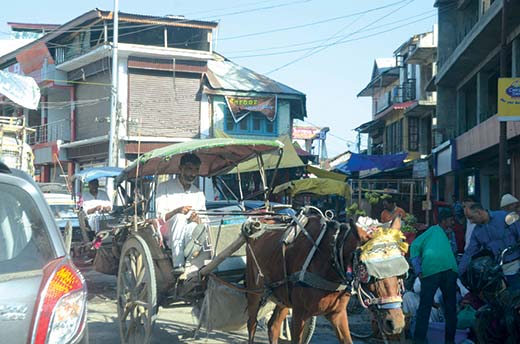
Secrets in Sopore are behind the drop-gates, so are the surprises like its busiest industrial estate, located far behind thick coils of concertina wiring. The partly militarised look of the estate heightened by the larger ‘rebel’ image sported by the town betrays the veiled state of its inner economic engine run by its men and women. Thousands of its residents, usually referred as ‘Zinda Dilan-e-Sopore’, work in cohesion to sustain town’s ‘self-sufficient’ image and keep the show going during peace and ‘war’.
At first left turn in the estate is Sopore’s major bat manufacturing unit, famed for its Star Trek brand. Inside its showroom are mementos – one signed by former South African cricket sensation, Jonty Rhodes, placed in a fascinating decoration. Three Pakistani players – Misbah Ul Haq, Salman Bhat and Kamran Akmal are holding the brand bats in three different portraits. “Most of our Kashmiri willow bats are famous in Pakistan besides in many Indian states,” says Ishtiyaq Ahmad, the second generation promoter of this 18 year old unit. “In every buyer-seller meet across India, we showcase our products which have already flooded major markets across North Kashmir.” The unit employing over 50 workers, mostly girls from underprivileged class, has a monthly turnover of around Rs 10 lakh, and counting.
But, there was a time in not so distant past when getting into the estate was next to impossible. Then, it was a garrison, with paramilitary forces occupying the 82-kanal plus estate during nineties, forcing the unit holders to put up an unwavering resistance to keep 16 units out of military might.
“Those were terrible times,” says Javeed Bhat, president Sopore Estate Unit holders, whose father’s steel unit spread over 5 kanal land was rendered defunct 25 years ago. “Just to keep forces away from these 16 units, we would buy them cigarettes or any petty things, they wished.” While the unit holders were braving daily battles for survival, Sopore was fast turning into theatre of security operations.
But the Suyya’s town founded somewhere around in 880 CE never ceased rebelling. And the same gusto was fuelled by its nonstop trade activity. To break this ‘self-sufficient’ town, locals say, many attempts were made to bring it to its knees. But given its strategic, commercial and interactive importance, this centrally placed town in the entire North Kashmir kept resisting attempts altering its status quo. It was during this disturbed phase, Sopore didn’t shirk from sustaining itself.
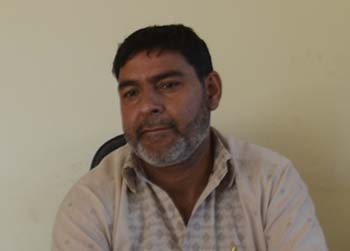
At Sopore’s Industrial Estate, the tough days might be over for unit holders, but the ‘occupation’ still trails behind, so do the memories of men who rallied behind the estate only to become casualty in the long run of Sopore’s tricky security atmosphere. One such man was Ghulam Nabi Khan.
In 1992, when the town was freaking out under security onslaught, Khan opened Sopore’s only ice making unit. Later, it started making ice-creams, thus feeding the entire North Kashmir. At pinnacle of his successful unit, Khan fell to bullets in the town, leaving his unit in a lurch.
Decimated over the loss, Khan’s loyal workforce didn’t let the unit to crash down. Some fifty of them joined hands for a ‘cause’ to keep the Khan Ice Factory, said to be Kashmir’s major ice factory, functional, against all odds. “After Khan sahab passed away,” says one of his workers, “we worked to keep his dream alive, the dream to sustain Sopore’s major ice and ice-cream unit.” Today, the collective effort of the workers churns turnover of around Rs 2 crores per season lasting just six months in a year.
If Sopore’s survival is a success, it all is based on small big success stories. Sadly, though, most of the stories are buried under the mass of the politics and the image of the place that has evolved over the decades, even before militancy started.
While cameras love to capture the town’s dissent, street voices often seethe in anger, without actually gloating over it, that how could people just perceive us through the security prism? “Is Kashmir repeating with Sopore what Delhi does to her?” they ask.
All these years, however, with militancy waxing and waning, the ‘unchanged’ Sopore kept the security apparatus in a fix. And behind this constant doggedness, there is a history, unwritten, so far.
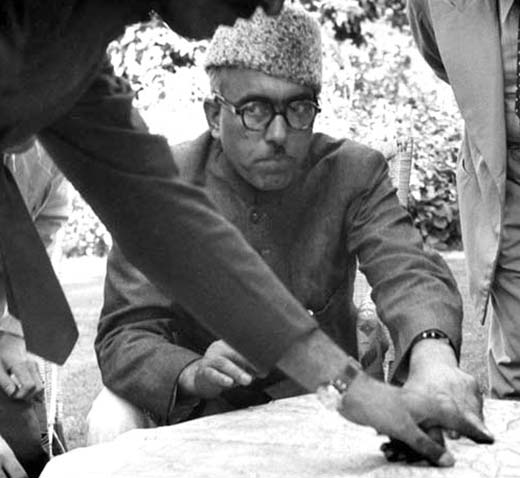
Sopore is known for throwing its support behind Kashmir’s ‘tallest leader’ Sheikh Muhammad Abdullah in past. During his crucial independence movement, Abdullah would visit Sopore before making any important political decision. They stood by Abdullah during his trying times, including when Abdullah was arrested on August 9, 1953.
But after February 1975, Sopore changed, forever. And the key trigger was the custodial killing of a local student Ghulam Muhammad Bulla, detained on February 14, 1975 for leading a procession against Indira-Abdullah accord. And then, they say, Sopore never looked back. It became bitterly anti-establishment. Home-grown leaders like Sofi Muhammad Akbar, who had divorced Abdullah camp post-accord assumed new significance in Sopore. It was the same time when Maqbool Bhat found an audience in the town. Later, the same truism of the town facilitated the rise of a school teacher into a ‘reckoning’ political figure of Kashmir, Syed Ali Geelani.
By 1989, Sopore had become default capital of Kashmir’s militancy besides its “pride”. Be it late Hizb leader, Abdul Majid Dar, or likes of Akbar Bahi and Ibn-e-Massod, Sopore always stood firm. But for its shift from an apple town to a rebel town, Sopore paid heavily – stacking up the wretched heap of destitute, orphans, broken lives, disappearances, and devastations.
It was repeatedly gutted. BSF set ablaze Shaheed Bazar of town on June 2, 1990. Then in July 1990, Iqbal Market was set afire followed by Arampora blaze on September 19, 1993 in which BSF killed three brothers for preventing “rape of their wives”. To conceal the truth, BSF reportedly set afire the locality. Over 38 houses and 40 shops were smouldering for three days.
And then on January 1993, a militant took away unmanned Light Machine Gun belonging to a 94 Bn BSF personnel, basking in the sun. To avenge the act, the BSF personnel ran amuck. In the mayhem that followed, 45 civilians were killed, mostly roasted alive, 16 civilians were injured and 37 residential and 352 commercial structures were razed to ashes. The incident continues to be unparalleled in the history of Kashmir. Again the town was subjected to fire in May, October and November 1993.
During that period, bullet hardly went into hiding in Sopore. People still recall old Eidgah, earlier known for the speeches of Khan Abdul Gaffar Khan and Jawahar Lal Nehru, and now by the mayhem that security forces unleashed.
But while Sopore was bleeding, many adhered to an old Wall Street cliché: “The best time to buy is when there’s blood in the streets”. In the long run, many say, the distressed investment helped Sopore to overcome security assault.
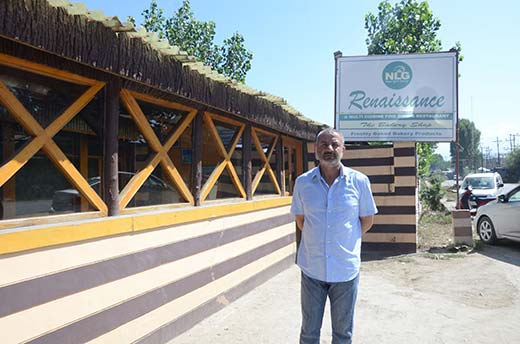
Perhaps it was the same mindset that motivated a Sopore man to rise from ashes, and restart his gutted venture. An orchardist cum hotelier, Mohammad Shaban Lone is running New Light Restaurant and Bakery Shop for many years now. Inheriting the business from his father, Lone’s hotel in the main Chowk went up in smoke twice during ’90s. Later he managed to restart his business from the scratch. “Due to rush of local and non-local fruit growers and buyers in Sopore,” he says, “my restaurant is running quite impressively. But given the reputation of the place, hotels aren’t yet retaining night rush at Sopore, which is a setback to its hospitality sector.” An employer of around sixty employees, Lone is seen as Sopore’s brand ambassador for hospitality.
But well before the emergence of new league of private players, the town was known as ‘Chota London’ for its prosperity. Even today, the town hasn’t ceased to prosper. “The town has 20 bank branches, making it a business hub of the entire north Kashmir,” says Ghulam Rasool, J&K Bank’s cluster head at Sopore.
However, despite its business buzz, Sopore faces denial of basic necessities, be it drinking water, roads and other amenities, says Lone. “We don’t beg for these things,” he says, “rather we deserve them. Ours is Rs 1200 crore horticulture industry, making us the highest taxpayer after Srinagar.”
Every fall, Sopore Fruit Mandi becomes busy, attending buyers across India. The apple mandi is considered the backbone of Kashmir’s economy and the majority of small fruit growers sell their produce to agents in Sopore. Sellers sitting beside stacks of apple boxes at their kiosks under the long tin roof sheds make a common scene inside the market, spread over 400 kanals of land, established in 1988. Over the years, it has emerged as the major fruit market outside Azadpur in Delhi. Last year, it sold 30 million apple boxes – a transaction of Rs 1200 crore.
The mandi throws up major job opportunities during apple harvesting season from July till December ending. But amid cash crop fortunes, the security concerns remain lingering.
The town keeps facing security dossiers. Not in recent past, with handful of militants active in the town, Sopore was ‘elevated’ to the status of a police district.
Interestingly, when the government in December 1994 claimed to have “flushed out” militants from Sopore, the town continued to be the emblem of the smouldering valley. Almost 18 years later in February 2012 with major militants including Abdullah Uni, the commander-in-chief of Lashkar-e-Toiba, done to death in Sopore, the state again staked claim to have rid the town from militancy. And since then, Sopore keeps witnessing occasional militancy spurts. Presently, Sopore’s poster boy of militancy is somebody – disowned by Hizb and hunted by security agencies – Qayoom Najar, the Lashkar Islami Chief.
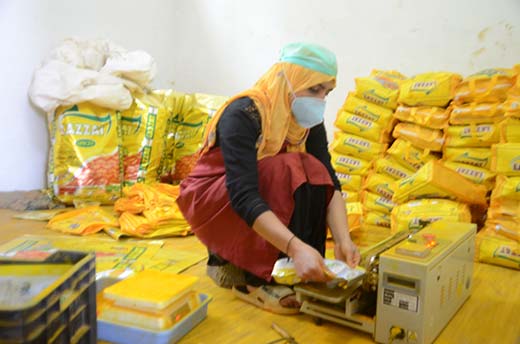
But far from the town politics, Food Park in Sopore’s Doabgah, the native village of parliament attack convict, Afzal Guru, is a calm place. It houses many economic units, including a spice processing unit run by a Forestry graduate.
Aijaz Ahmad is the scion of Sopore’s household grocers, Mohammad Akbar-Farooq Ahmad, supplying major grocery items in entire North Kashmir markets. After successfully creating base of valley’s renowned spice in the region, the grocers came up with their own brand in 2014, which took off in March 2015. Within the first week, Rs 2 crore went in Unit’s launch. “At the end of first calendar season,” says Aijaz, the proprietor, “the unit is expected to churn turnover of around Rs 10 crores.” But more than revenue, for Aijaz, the main motive is to pump his unit’s spices into pan Kashmir market for larger consumption.
Within its five month’s journey, Lazzat spices have been given Agmark, a certification mark employed on agricultural products in India, assuring that they conform to a set of standards approved by the Directorate of Marketing and Inspection, an agency of the Government of India. “Otherwise it takes any agricultural product years to acquire that trademark,” says Aijaz, crediting quality and packaging of his products for the early recognition.
One of the things which worked like a charm for the Lazzat was the massive support it got from the local market. Within a short span of time, Aijaz says, the seventy per cent local market prefers Lazzat over other spices. “With this support,” he says, “I am here to stay unlike other local business houses that fled Sopore for Srinagar.”
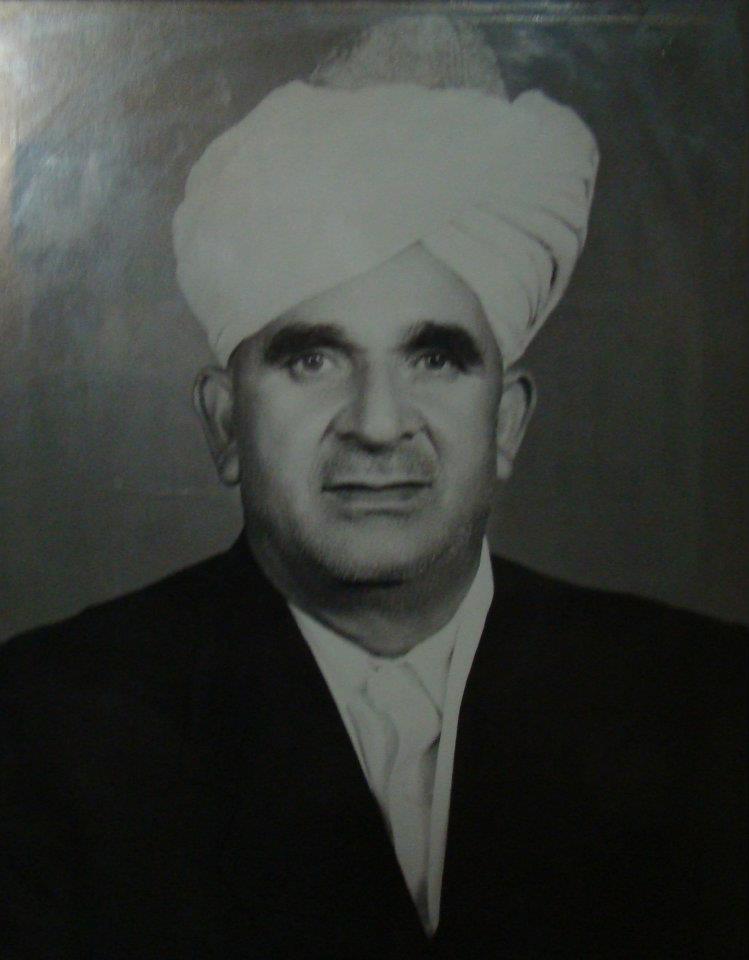
Traditionally Sopore was known for Reada (cart), Rub (dirt) and Rupyea (money). But for most of its recent history, Sopore was known for its riches before the rebel tag erased some of its realities. Prior to that change, Abdul Samad Pandith, a legendary forest lessee known for his philanthropy put Sopore on developmental map. He is being credited for setting up many firsts in Sopore, including Joinery Mill, Samad Talkies (movie theatre), Dairy Farm, Jam-Jelly factory and other industrial units. The vision of the man who secured most of the forest contracts during his time and raised the daily wages of labourers from 50paisa to Rs 2 a day is still being talked about in the town. “He was Kashmir’s Hatim Tai,” says Vikar Pandith, his grandson, running Sopore’s Hassan Petrol Pump along with his brother. “His generosity is known to everyone in Sopore.”
After Samad Pandith’s demise, his clan dispersed from Sopore because of bad loans and migration. In migration, not many Pandiths shone like Farah Pandith, Samad’s granddaughter, who made to banner headlines across globe in summer 2009 for becoming Obama’s special representative to Muslim communities. Two years after her birth, Farah’s parents had migrated to US in 1970 where she grew up in Massachusetts with a diversity of faiths, ethnicities and perspectives. She was tasked to win Muslim hearts from Sao Paulo to New Delhi by endorsing, ‘Look, America ain’t all that bad’!
If Farah became brand ambassador of Sopore away from home, then Baseema Aijaz, another Soporite became the town’s ‘inspiration’ while staying put.
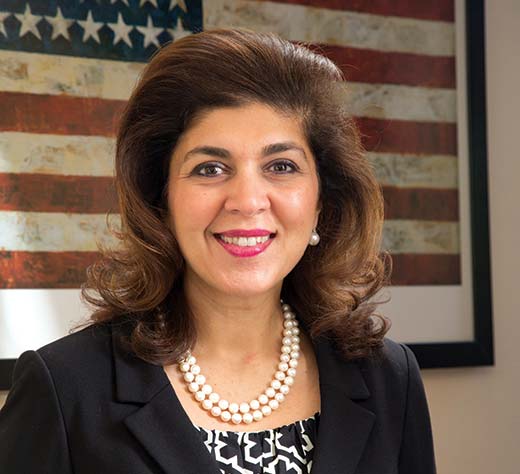
Baseema was highly paranoid over the prospects of her township whenever she would visit home from Bangalore to spent vacations. Absence of glaring developmental signposts in Sopore would make her feel disappointed. But by 2006, she was no more feeling down. She gave up studies with a motive to alter the way Sopore brings up and educates its future.
By the time she joined her father Anayatullah Hajini’s Welkin School, established in 2000, she knew things won’t be simply a pushover. “Schooling is all about learning and value system, which collectively mould the final character of children,” she says. “At Welkin, we help children to develop the four pillars of learning: knowledge, skills, disposition and feelings.”
Apart from introducing smart classes, guest lectures, and interactive sessions, she says, Welkin imparts holistic development in students. “Welkinians have made their mark in various fields at the state level,” she says. “From last two years, we have been grabbing the top positions in Class 12. Hopefully, we complete hatric this year.” With a fleet of 45 buses transporting around 5000 students daily, the Welkin School spread over above 30 kanals has apparently ended the monotony of century old St Joseph School over the region. It has a built-up area of more than 65,000 sq ft. “We assure parents that we take care of your child’s spiritual, intellectual and physical growth,” says Baseema, who believes in the motto, “You only live once, but if you do it right, once is enough.”
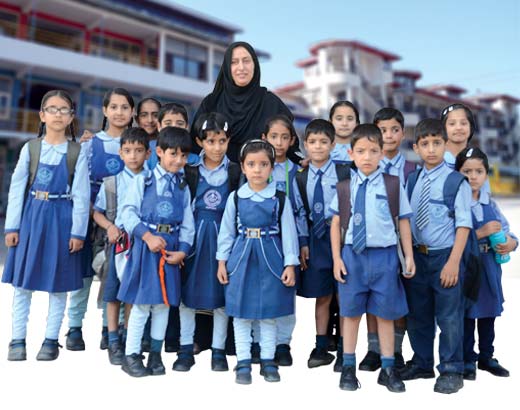
Meanwhile, seventeen years after Sopore-Kupwara road was occupied by army, the road is back to public service, expecting to revive the economic prospects of Sopore. But behind drop-gates and coils of concertina wires, men and women of apple town camouflage with military look, continue to toil keeping Sopore’s ‘self sustaining’ engine of economy on.


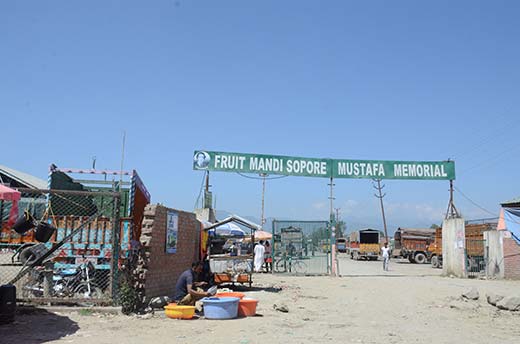














Real a solid sopore…